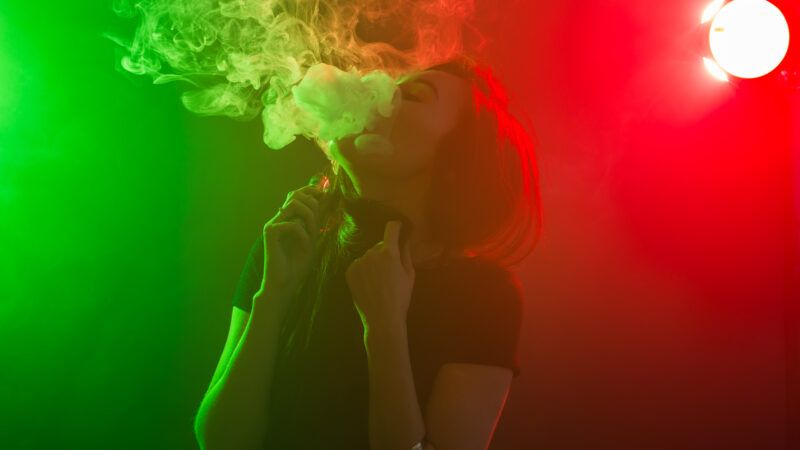Massachusetts' Tobacco Ban Went as Badly as You'd Expect
And now the state thinks it needs to crack down even more.

In November 2019, Massachusetts became the first state in the U.S. to ban the sale of all flavored tobacco and nicotine products, including flavored electronic cigarettes and menthol cigarettes. Four additional states have since imposed flavor bans on some products and similar policies are under consideration in many other jurisdictions. Such bans are popular among legislators and anti-smoking groups, but the latest data from Massachusetts highlight the ban's unintended consequences. The state's experiment in prohibition has led to thriving illicit markets, challenges for law enforcement, and prosecution of sellers.
Massachusetts' Multi-Agency Illegal Tobacco Task Force publishes an annual report providing insight into how the state's high taxes and flavor prohibitions affect the illicit market. As opponents of the flavor ban predicted, the law has incentivized black market sales of menthol cigarettes and flavored e-cigarettes ("ENDS," or "electronic nicotine delivery systems," in the parlance of regulators). "The Task Force identifies the cross-border smuggling of untaxed flavored ENDS products, cigars, and menthol cigarettes as the primary challenge for tobacco enforcement in the Commonwealth," according to the report. "Inspectors and investigators are routinely encountering or seizing menthol cigarettes, originally purchased in surrounding states, and flavored ENDS products and cigars purchased from unlicensed distributors operating both within and outside the Commonwealth."
The Massachusetts Department of Revenue reports conducting more than 300 seizures in FY 2022, compared to 170 in 2021 and just 10 in 2020. Many of these involve substantial amounts of products and missed tax revenue. For example, a single search warrant yielded "a large quantity of untaxed ENDS products, [other tobacco products], and Newport Menthol cigarettes affixed with New Hampshire excise tax stamps" representing an estimated $940,000 in unpaid excise taxes.
Revenue officials are seizing so many illicit products, in fact, that they are running out of room to store them. The "Task Force's increased investigative and enforcement activities during the past year have led to the seizure of large quantities of illegal tobacco products, resulting in a strain on the Task Force's storage capacity," says the report. But fear not, they are working on leasing additional space "that will significantly increase storage capacity and allow for continued increased enforcement."
Official seizures represent only a fraction of the illicit trade, so the actual extent of illegal products and lost revenue is certainly larger. The state's report notes that tobacco tax revenue has fallen by approximately 22.6 percent over three years. This is partially due to declining rates of smoking, but the authors acknowledge that smuggling of untaxed products may also be a factor.
A recent analysis of sales data by Reason Foundation, the nonprofit that publishes Reason, found that the decline in cigarette sales in Massachusetts coincided with substantial increases in sales in counties bordering the state.
Advocates of flavor bans downplay the potential for criminal prosecutions, but the experience in Massachusetts demonstrates that opponents are right to highlight this concern. The Task Force takes note of multiple criminal investigations leading to indictment or prosecution. Although violating the flavor ban is not in itself punishable by imprisonment, forcing these products onto illicit markets results in sellers violating state tax law. In Massachusetts, this is a felony punishable by up to five years in prison.
It's only a matter of time (if it hasn't happened already) before the first American will be sentenced to prison for selling menthol cigarettes or flavored e-cigarettes. It's likely to happen in Massachusetts, where two men were arraigned last month on charges including tax evasion, money laundering, conspiracy to commit tax evasion, and flavor ban violation.
This is exactly what groups including the American Civil Liberties Union, the Drug Policy Alliance, and the National Association of Criminal Defense Lawyers warned would happen under a federal menthol ban in a public letter in 2021. More recently, the New York State Sheriffs' Association wrote Gov. Kathy Hochul last month objecting to a proposed ban on menthol cigarettes on the basis that it will encourage smuggling. "We believe the proposed flavored tobacco ban and excise tax increase will only exacerbate this problem and provide hundreds of millions of dollars in additional illicit profit to criminals and criminal organizations," wrote Peter Kehoe, the Association's executive director. (New York already bans flavored e-cigarettes.) Massachusetts provides ample reason to conclude that this is a reasonable expectation.
The experience in Massachusetts has vindicated concerns that flavor bans will lead to illicit markets, arrests, and incarceration. Coupled with foregone tax revenue, evidence that the public health benefits may be less than promised, and the risk that banning flavored vaping products will deter smokers from switching to safer sources of nicotine, the unintended consequences of these policies are significant.
The Massachusetts Task Force report concludes with a series of legislative proposals responding to the flood of illicit products. If you were hoping that these proposals might include repealing flavor bans and making it legal to sell flavored vapes or menthol cigarettes to consenting adults, prepare to be disappointed. Instead, the Task Force suggests creating new felony criminal penalties for selling tobacco without a license, obtaining more inspection powers, and making it illegal for licensees to purchase tobacco products with cash.
Last year, while detailing our new era of nicotine and tobacco prohibition for Reason, I wrote that "there is a real risk that American tobacco policy will open a regressive new front in the war on drugs, just as the previous crackdown on psychoactive substances begins to wind down." By responding to the failures of its first-in-the-nation flavor prohibitions with a wish list for more police powers, this is the path Massachusetts appears poised to go down. States that wish to avoid making the same mistake should view Massachusetts as a warning, not a role model.


Show Comments (40)